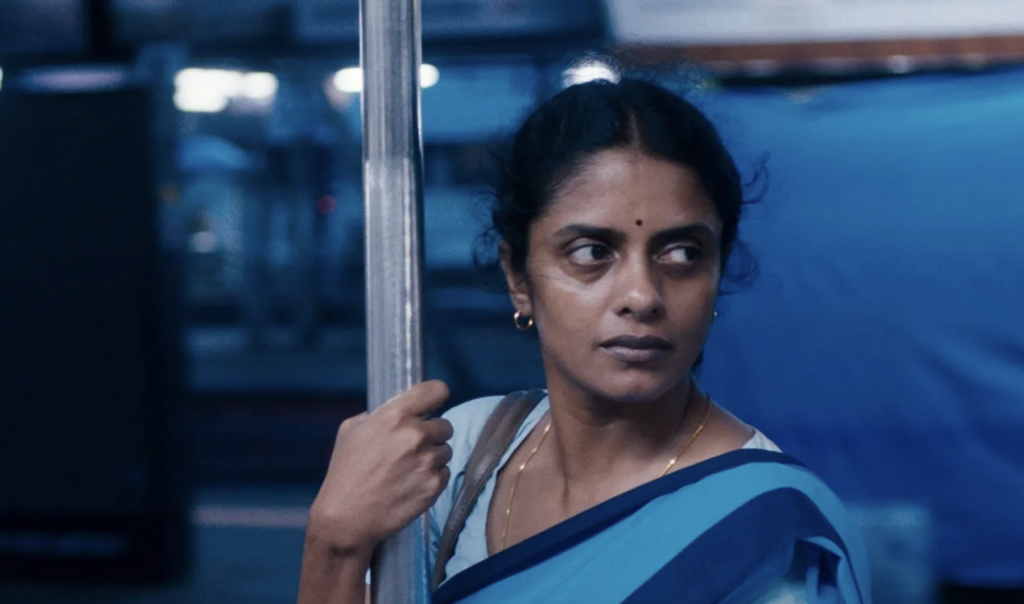Payal Kapadia’s “All We Imagine as Light” comes to New York City attached with a host of commendations and honors. We’ll wait to hear what the jurors at the Asia Pacific Screen Awards have to say about it, but Ms. Kapadia’s picture has already been recognized by the San Sebastián International Film Festival for its focus on “subjects related to the female world.”
The cinéastes at the Cannes Film Festival did better by the female world twice over, conferring upon “All We Imagine as Light” the Palme d’Or and the Grand Prix. Experts from Sydney, Chicago, and Montclair, New Jersey, have also chimed in with their commendations.
Ms. Kapadia’s free-ranging tale of hard-scrabble lives at packed-to-the-rafters Mumbai is a movie that deserves the accolades it has garnered and those that will undoubtedly continue to roll in. Lead actress Kani Kusturi cuts a remarkable figure, her deeply set eyes and pensive bearing evoking the gravitas we recognize from Egyptian fayum portraits. The cherubic Divya Prabha embodies the headiness of forbidden love with dizzying conviction. Chhaya Kadam carries just the right amount of acceptance and frustration as a woman at the mercy of circumstance, capital, and culture.
Ms. Kapadia’s first feature film was a documentary about social strictures and frustrated love, “A Night of Knowing Nothing” (2021). “All We Imagine as Light” retains aspects of cinéma vérité in how the camera is brought both into the thick of interior lives and through the masses of people traversing Mumbai. Working with cinematographer Ranabir Das, Ms. Kapadia traverses the city’s byways with an ethnographic eye, but sometimes blurs the division between fact and fiction. When she superimposes snippets of interviews with actual citizens onto the story, the director introduces the literal at the diminution of the poetic.

At the center of “All We Imagine as Light” is Prabha (Ms. Kusturi), a 30-something nurse whose disappointment with life is as great as her physical exhaustion is palpable. She’s married, our Prabha, but her husband has long since disappeared, having traveled for work to Germany. When she musters the wherewithal to call his last known phone number, the recorded message declares that it’s no longer in service. We aren’t surprised by this turn of events and neither is Prabha. Stoicism can’t mask her desperation or her sorrow. Ms. Kusturi holds in so much and communicates so clearly. She is a remarkable actress.
Prabha shares a flat with Anu (Ms. Prabha), a fellow nurse working at the same down-at-the-heels hospital. Anu is 20 years younger than her roommate and is beset by phone calls from her parents back home: “Just when do you plan on getting married?” One of the funniest scenes in “All We Imagine as Light” has Anu swiping through an online array of bachelors that has been sent along by mom and dad. Her running commentary is caustic. Anu’s on-the-sly boyfriend Shiaz (Hridhu Haroon) looks on with resigned bemusement.
Finally, there is Parvaty (Ms. Kadam), a cafeteria cook at the hospital commissary who is admiring of Prabha’s intelligence and leery of Anu’s moral compass. She’s as good of a gossip as the rest of us, but is befuddled by the rules of men: Parvaty has received an eviction notice from a real estate company out to develop luxury housing on her property. But is it her property? Parvaty’s husband has long since passed away and hadn’t done much communicating with his wife. Parvaty and Prabha turn the apartment upside down to locate the required paperwork — to no avail.
A caveat that can be brought to bear on “All We Imagine as Light” lies in its length, or, rather, how it doesn’t altogether justify coming in just short of the two-hour mark. As it is, the dramas that play out within the film’s parameters disperse in energy as they wander to their conclusions.
Ms. Kapadia’s picture is kaleidoscopic in structure, but its intimacies are ultimately rendered more symbolic than tender. A less charitable editorial hand should’ve been welcomed into the fold.
“All We Imagine as Light” is a parable about women without men, about the limits of opportunity, the tangencies of friendship, and the irksome nature of fate. When the film shifts to the beaches of a southwestern region of India, Kerala, we are grateful for the respite from the congested precincts of Mumbai.
Were Ms. Kapadia not so clearly taken with the complexities of city life, she might have let her picture devolve into a sentimental advocacy for the wide open spaces. As it is, the feel-good ending she’s contrived is by no means a guarantee of happily-ever-after. New beginnings, not easy answers, are the hallmark of this moderately flawed and deeply humane movie.
(Except for the headline, this story has not been edited by PostX News and is published from a syndicated feed.)

